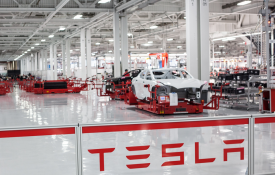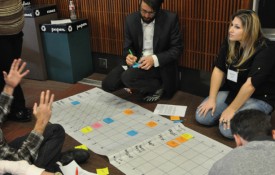First impressions can be deceiving. At a glance, Frank Addante seems like the fresh-faced kid who just delivered the pizza to the office lunchroom. His unassuming demeanor, refreshing candor, and casual attire do not telegraph the substantial influence he has had as an innovator in his industry.
Addante’s company, Rubicon Project, has rapidly become a leader in the juggernaut of digital advertising with more than 3 trillion bid requests processed every month. However, the 37-year-old Chicago native is a traditionalist to the core. To hear him tell it, the path to his success has been paved with the simple masonry of “good, old-fashioned hard work.”
The company’s Playa Vista offices feature an open floor plan that feels like a giant, collaborative think tank. There are no cloistered VIP offices; spacious halls are lined with walls declaring the company’s core values, which center on People, Product, and Customers; and glass-encased conference rooms pay tribute to trailblazing innovators such as Nikola Tesla, Johannes Gutenberg, Alan Turing, and Thomas Edison. At the center of all this activity is a conglomeration of colorful graphic display screens that track the real-time transactions and algorithms, bringing to mind a hybrid of NASDAQ and starship command center.
Quite simply, Addante is doing for advertising what others have done for a number of other services – from booking a flight to buying concert tickets – seamlessly rolling it into the world of automation. With its Advertising Automation Cloud platform, Rubicon Project has made it ridiculously easy to buy and sell ad space in all available online capacities. And he doesn’t plan on stopping there.
“[Our] vision was to start with digital advertising,” he says, “but our mission is to automate all advertising.”
“We’re a bit behind the scenes,” he continues. “We’re the first company to come along and connect over 100,000 advertiser brands with 650 million users. There’s no other technology platform or company that reaches more users on the Internet.”
In 2013, Rubicon Project passed Google as the No. 1 company in terms of Internet audience reach, with more than 95 percent of the U.S. audience being exposed to its customers’ ads. The company counts 40 of the Top 100 ranked websites as users of its platform, including Time Inc., Wall Street Journal, and Tribune Company.
Photos by Zach Lipp
With such substantial facts and figures to corroborate his vision, Addante is a compelling pitchman for Rubicon Project’s ambitious mission. A college dropout who studied electrical and computer engineering, Addante is yet another example of tech success stories (Bill Gates, Steve Jobs, and Mark Zuckerberg are a few notable others) who have proven that academic accolades are not a necessary path to reach the pinnacle of business prosperity.
After dropping out of college, Addante left Chicago, a city “not known for its innovation,” he admits, and landed in Los Angeles. He quickly made an impact on the tech landscape before moving north to Silicon Valley in 2004 because, at the time, LA didn’t have as much access to venture capital. “The myth is that there wasn’t as much talent here,” he recalls.
“There’s a ton of talent here in Los Angeles,” Addante continues. “LA’s been a great source of innovation. We just need to shine a light on it. If you think about innovation in the entertainment industry, a new movie is like a new company.”
Addante returned to Los Angeles a couple years later and is a staunch supporter of the region’s wealth of innovators – locally grown as well as those attracted by the quality of higher education Southern California offers. Keeping brilliant people in the region, however, can be a challenge due to misconceptions about where the opportunities lie. “There’s this huge brain drain where we’ve got these great universities where engineers are coming to Southern California, and then they leave. They go to Silicon Valley. They’re not even aware there are engineering jobs available at companies here.” The reality is that there are “hundreds of startups being created here every year.”
In 2013, Rubicon Project passed Google as the No. 1 company in terms of Internet audience reach, with more than 95 percent of the U.S. audience being exposed to its customers’ ads.
His advice for the young entrepreneur? Keep it simple. Coming from Addante – a man who has launched six companies, resulting in one IPO, two acquisitions, and a combined market value in excess of $1 billion – that seems like a contradictory proposition. “Don’t over-complicate things,” he advises. “Companies are more likely to fail from indigestion than from digestion. And be persistent. You have to see through walls and see around corners.”
He considers his management style “adaptive,” admitting some people would label that as “inconsistent.” Yet for all his “real-time decisioning,” Addante is a pragmatist. “I don’t believe in ‘gut’ feelings,” Addante says. “I do have gut feelings, but they’re all data driven.”
Asked what his process is for deciding what projects are worth pursuing – and to what degree – he says there are three questions he asks himself when evaluating an idea. “Why do I need it? Why do I need your [idea] specifically? And the third, which is the most difficult,” he summarizes, is “Why do I need it right now? Not six months ago, [and] not six months from now.”
With that kind of precision, drive, and vision, Frank Addante will continue to be a force with which to be reckoned.












































